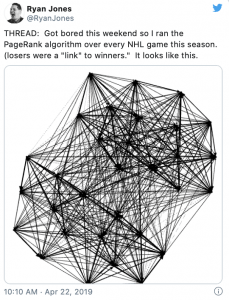Using PageRank to Predict Sports Game Wins
In class, we discussed PageRank as being like a “fluid” in that it flows throughout the network and collects at the nodes, or pages, that are most important. PageRank operates by quantifying the number and quality of links to a page find out how important that page is. Thus, more important webpages are likely to get more links from others.
In this article I found, Ryan Jones, the SEO Group Director at Razorfish, explores using SEO concepts, specifically PageRank, in other situations besides the web. Jones’ original question is: how can PageRank be adapted to measure the authority of other things? His theory surrounding using PageRank in non-web situations involves sports, specifically football, to predict the most authoritative team in the NHL. PageRank would look at the quality of wins, rather than the total wins due to the imbalanced way teams are scheduled to play one another during a particular season (e.g. one team x may play another team, y, multiple times, while other teams may play only once with y). Jones first uses a crawl map (site map) to calculate the PageRank on a tool called Gephi on NCAA college football teams (victories as directed graph) as well as for NHL teams. For the former example, he ran the PageRank algorithm over a graph consisting of every 2018 NCAA D1 football game. In this graph, every team (node) pointed to the team that beat them. The top 10 teams were then able to be displayed. There is no further information in the article itself analyzing this data. In addition, Jones’ crawl map is not labeled in any way, so it is difficult to analyze it.
However, in the latter example with the NHL, Jones goes to say that the PageRank algorithm successfully predicted that the St. Louis Blues (STL) would win the Stanley Cup. The crawl map shows that STL, PIT (Pittsburgh Penguins) and BOS (Boston Bruins) were the best three teams (to make it to the playoffs), and it turns out that STL beat BOS for the Stanley Cup in 2019. Again, Jones’ crawl map is not labeled in any way, so I cannot determine the accuracy of his results (it is unclear how he determined that STL was the best team based on the graph).
However, in Jones’ final example, the focus of this article, he goes into detail of creating the graph and analyzing it. He creates a force-directed graph of every NHL regular season game.
Each node (team) links to the nodes (teams) that beat them. I believe that the colors of the edges/links in this graph indicate the color of the winning team between the two nodes, based on the limited information in the article. Jones then runs the PageRank algorithm on the data and the Colorado Avalanche is at the top of the list.
Jones’ approach to adapting PageRank to other predictive situations is interesting and makes me wonder what else PageRank can be applied to. And how reliable are these predictions? Will they change within the next few months?
https://www.searchenginejournal.com/pagerank-predict-nhl-playoffs/375125/#close




